Expert: Up to 80% of rape crimes go unreported in Spain
Social stigma and the prospect of a harrowing court ordeal mean the country is among the least likely to call out sexual abuse in the EU
Madrid
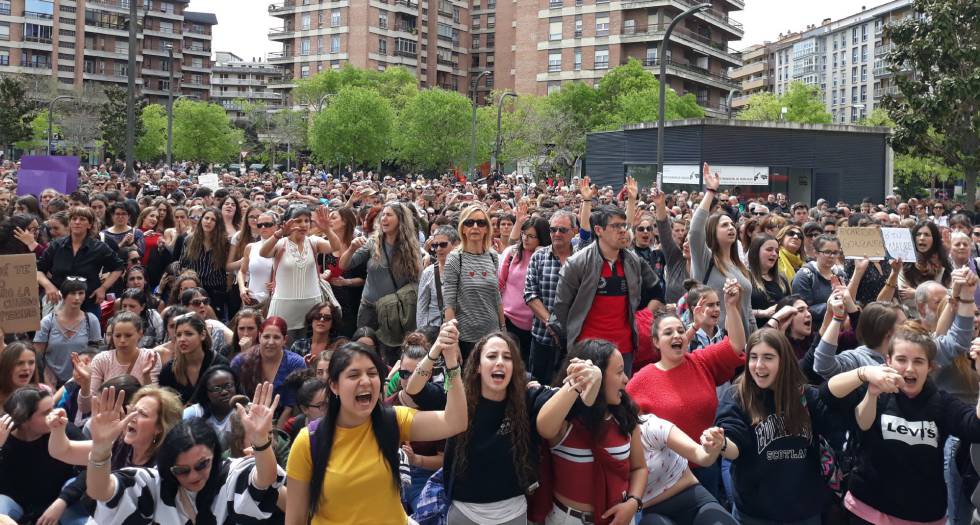
Protest in Pamplona against a court‘s decision to acquit five men of gang rape. EUROPA PRESS
In Sweden, 2015, there were 56.8 allegations of rape for every 100,000 inhabitants, 20 times more than in Spain where just 2.65 sexual attacks were reported, according to Eurostat, which states these figures do not reflect the number of crimes actually committed. Eurostat adds that the discrepancy between countries such as Sweden and Spain “is also to do with general awareness and the attitudes toward sex offenders.”
The fear of not being believed and a lack of confidence in the justice system are paralyzing
DOMESTIC VIOLENCE ATTORNEY AMPARO DÍAZ
Of the 32 countries analyzed, Spain ranks number 25 – well below the European average. The social stigma, the trauma of the trial and the fear of not being believed are all factors that deter Spanish rape victims from going to the police, say experts.
According to Pilar Martín Nájera, an attorney specializing in gender violence, between 70% and 80% of rapes in Spain are not reported. Taking a case of rape to the authorities is complicated, and not just because it is hard to prove. “It’s a traumatic process for the victim and, due to the high percentage of acquittals, there’s a sense of impunity,” says Nájera.
The crime attacks a person’s sexual liberty and is an assault on their most intimate selves; after living through an ordeal that triggers extreme panic, reporting the rape involves what is often referred to as “the second rape.” The victim relives the attack when they are asked by the authorities to give a blow-by-blow account of it. As Nájera points out, they are fielding questions such as “Why didn’t you resist? Why didn’t you shout out or ask for help?”
“The fear of not being believed and a lack of confidence in the justice system are paralyzing,” says domestic violence attorney, Amparo Díaz. “The victim’s story is bound to be questioned and they are then re-victimized.”
Doing nothing to restore that confidence is the recent verdict against La Manada(the wolf pack) – the five youths in Pamplona who were judged to be guilty of “prolonged sexual abuse” as opposed to rape after attacking and repeatedly penetrating an 18-year-old woman in 2016 at the San Fermines bull running festival.
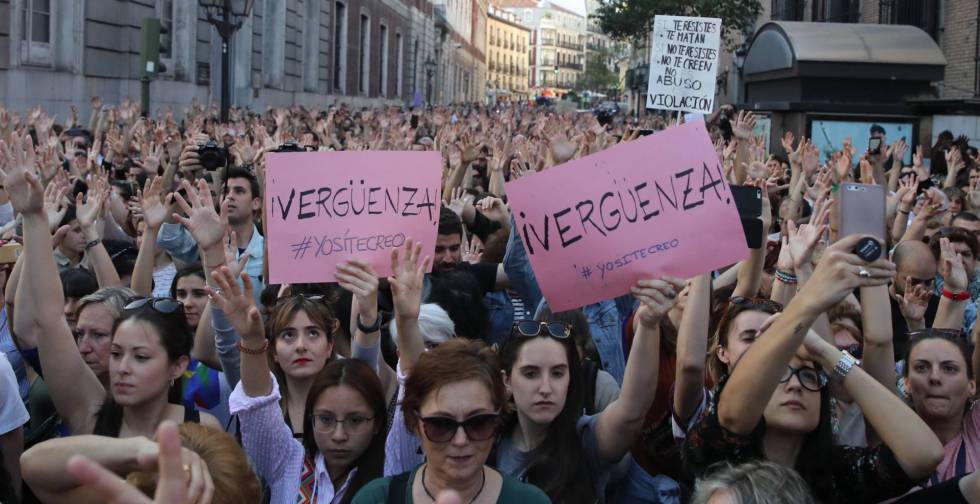
Consuelo Abril, a lawyer working with the 7N movement against gender violence, insists that the problem does not lie with the criminal code itself, but with how it is interpreted by the authorities. “People are more likely come forward with allegations if the system supports the victim and doesn’t question their story,” she says.
Unlike Spanish law, which insists there must be violence and intimidation for there to be rape, the law in Sweden, as in Belgium and the UK, considers any sexual relations without the women’s tacit or explicit consent to be rape. Similarly, in France and Germany, the term rape does not necessarily involve violence. Needless to say, these countries have an above-average number of reported rapes.
Social stigma
The degree of blame and suspicion victims feel when they come forward depends on their environment. “Women are still afraid and above all embarrassed,” says Tina Alarcón, president of victims association CAVAS, pointing out that even fewer allegations are made in rural and provincial environments due to the lack of anonymity.
“Spanish society has rewarded macho values for a long time,” says forensic psychologist Timanfaya Hernández, adding that in other countries women would seem to be clearer about their rights and what constitutes consensual sex.
Spain has one of the lowest reported number of rapes in Europe
“When the attacker is a stranger who pounces on his victim in an empty street, the question of consent is not an issue. But most rapes are committed by people we know, such as family members, close friends or teachers,” says Hernández. In these cases, the victim is liable to feel guilty because they may have conceded a kiss or agreed to enter the attacker’s house. Certain sections of society may also question the expectations of a woman who goes off with someone they have only just met.
When the victim is a minor it usually takes years before they dare to make an allegation of sexual abuse, and by then it is often too late. The rapist often silences the minor with emotional blackmail, threatening to harm another member of the family or worse. When the victim is old enough to understand the abuse for what it is, they are frequently paralyzed by the prospect of their family’s reaction, according to Hernández. If the family doesn’t believe them, it can be devastating. But it can be equally disruptive if they do.
When it comes to couples, abuse can be even harder to report and allegations are even fewer. “We have internalized marital rights to such a degree that at times women are either unaware of abuse or fail to give it importance,” says Alarcón. Díaz, meanwhile, mentions that some victims prefer not to report abuses because to do so would be to open the bedroom door, as it were. “They are considered semi-private crimes,” she says.
AVOIDING A CULTURE OF COMPLICITY
Despite the difficulties facing victims, Consuelo Abril considers that reporting rape and abuse is a duty; to avoid doing so is to promote a culture of impunity. But rape is hard to talk about. According to Díaz, one of the main problems in the judicial system is the lack of psychology in handling the victims. But Nájera believes the cross-party pact against gender violence arrived at in September 2017 has improved the training of all those in contact with victims, from doctors to judges. Another step in the right direction, she says, is the 2015 statute that protects a victim’s privacy.
Following La Manada verdict, a call went out to women to share their experiences of abuses and attacks on Twitter under the hashtag #cuentalo. According to Martín Vallejo, this has established an important turning point. “Society sees that relations against the will of one of the participants are neither admissible nor tolerable,” he says.
One of the most concerning trends for both Díaz and Nájera is the normalization of abusive sexual practices among adolescents via pornography. According to Díaz, we need to educate the young so they realize women are not objects for male consumption. This should be done at primary age to counteract the messages they receive through the media and publicity.
English version by Heather Galloway.

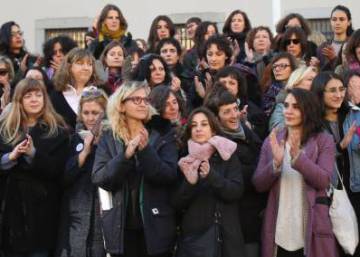
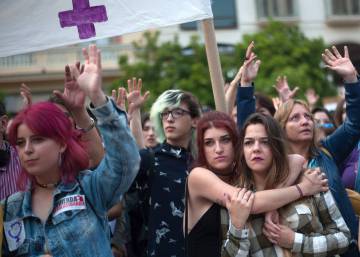
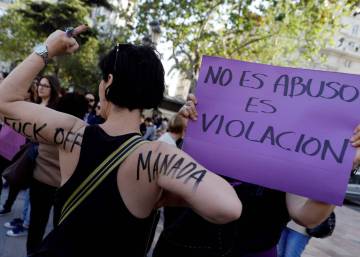





































No hay comentarios:
Publicar un comentario